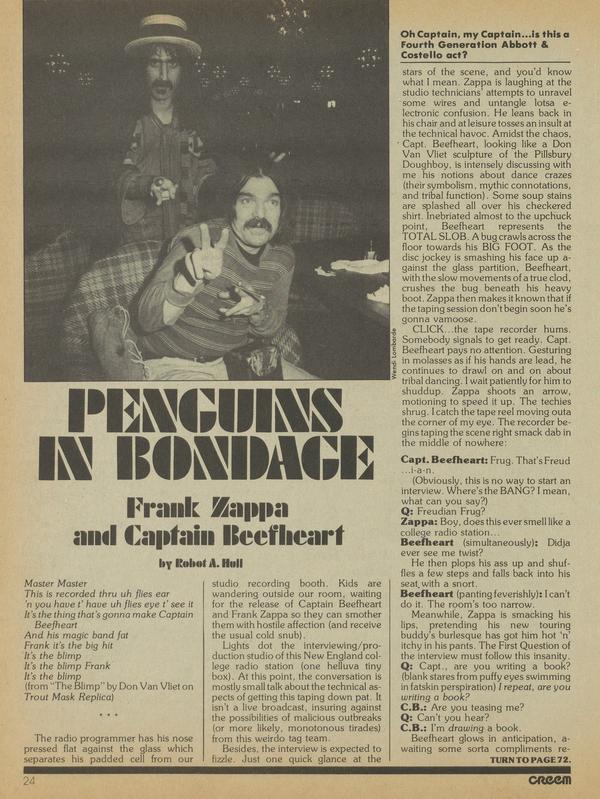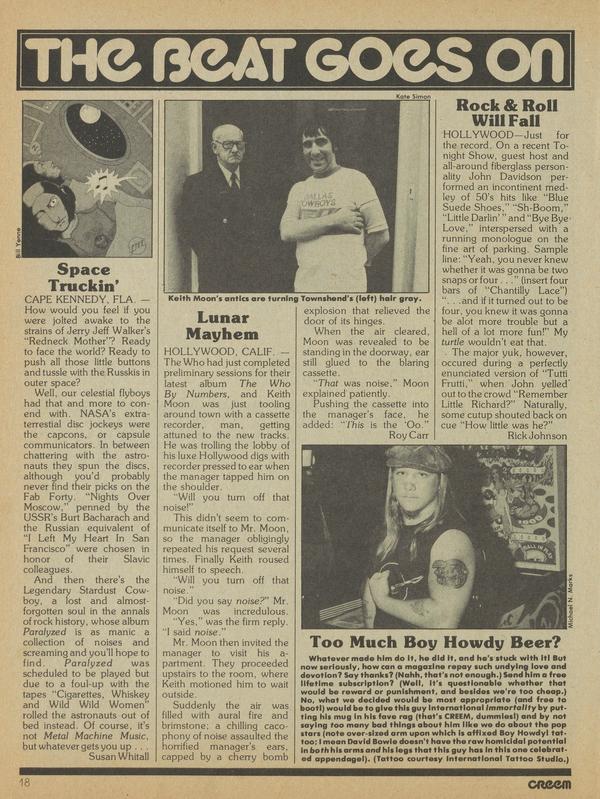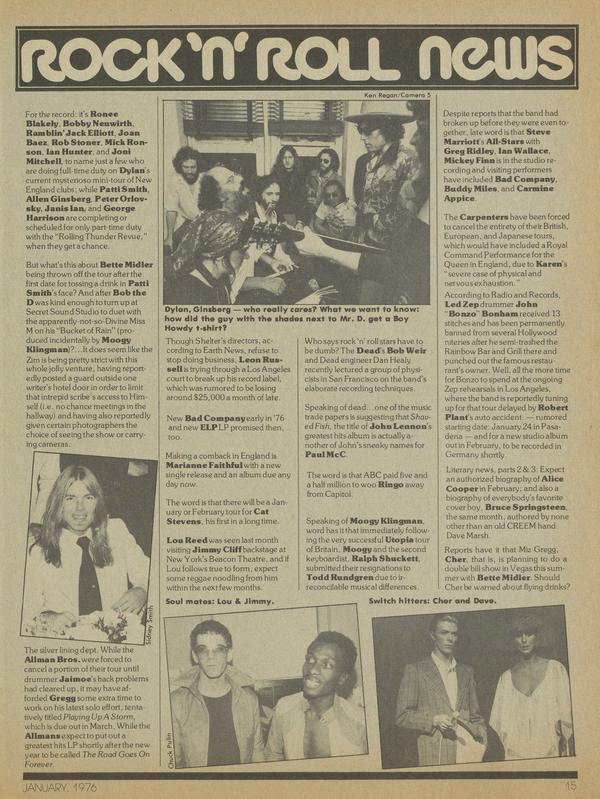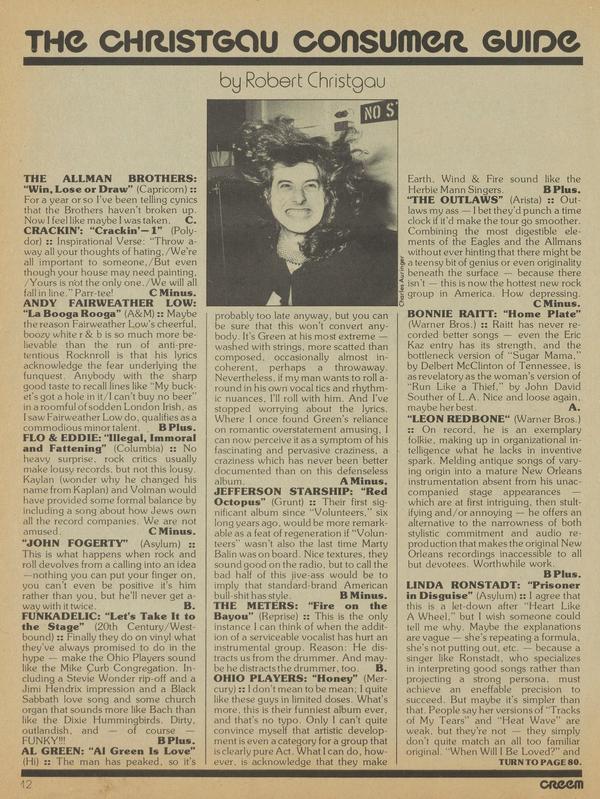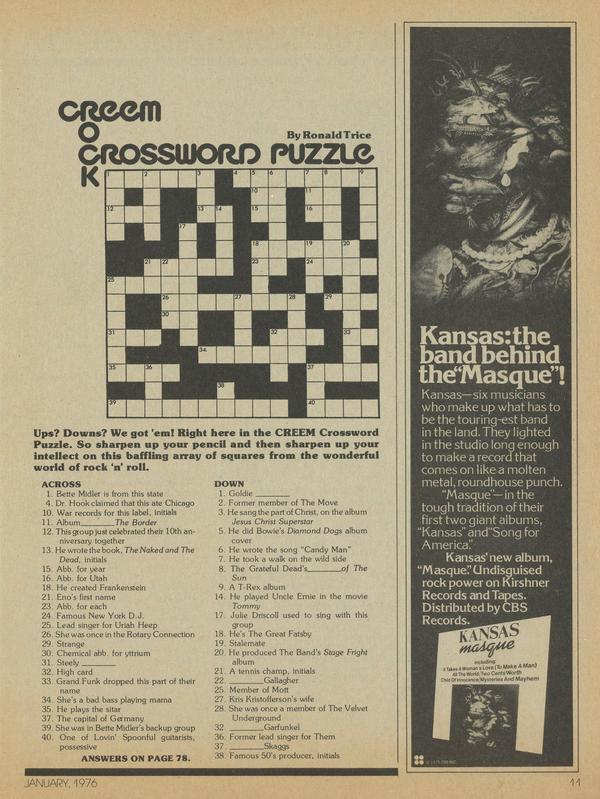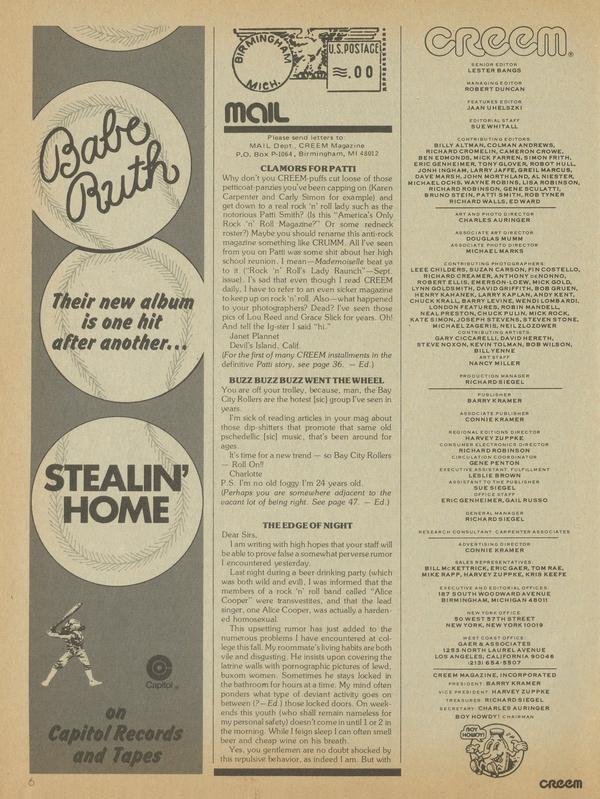LIZTOMANIA: KISS ME WHERE THE SUN SHINES
“People are going to start thinking I’m Tommy. Liszt is a quick way of showing them I’m not Tommy,” Roger Daltrey recently told reporters, explaining why he took the part of Franz: to conquer an identity crisis.

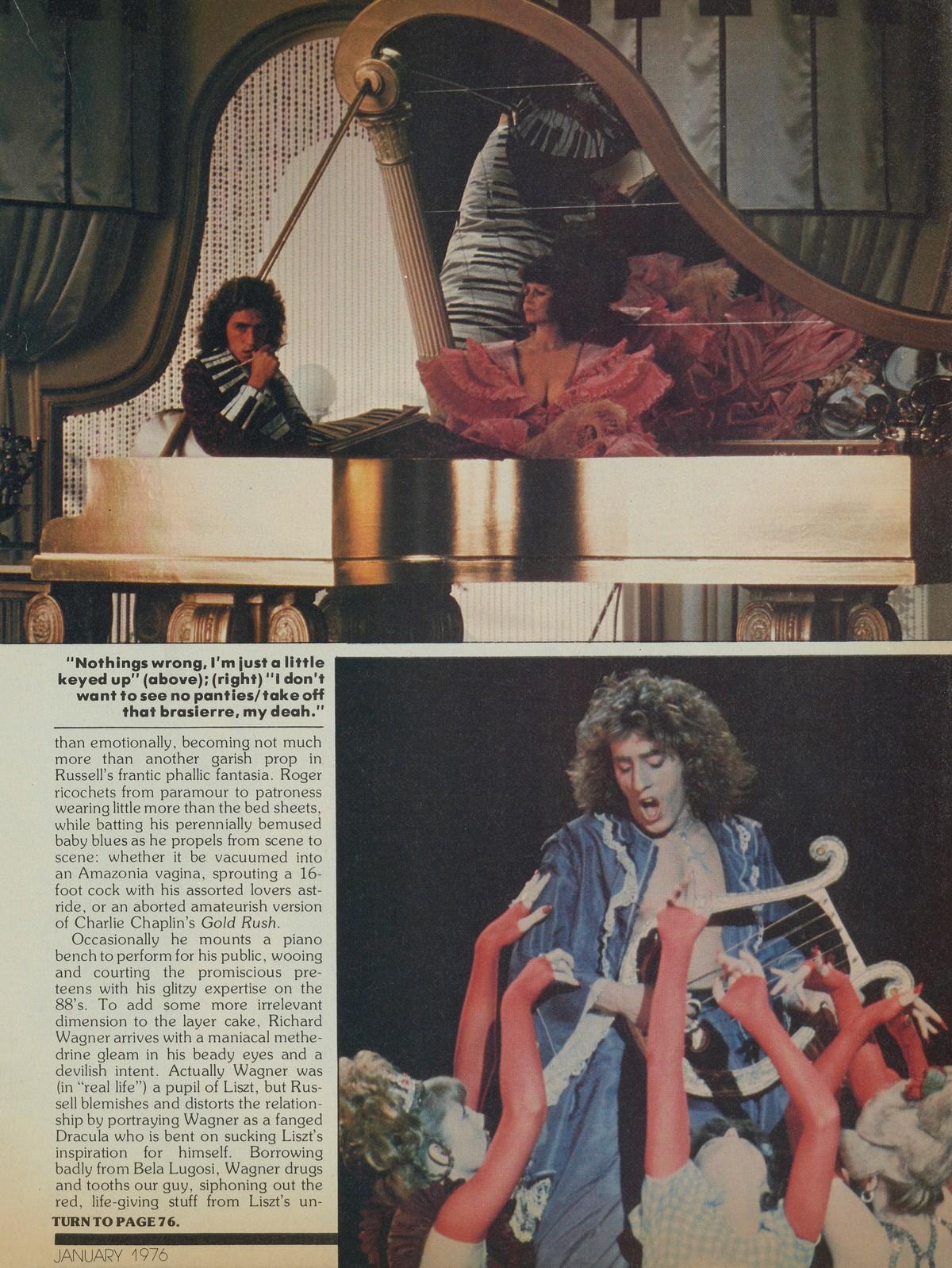
The CREEM Archive presents the magazine as originally created. Digital text has been scanned from its original print format and may contain formatting quirks and inconsistencies.
“People are going to start thinking I’m Tommy. Liszt is a quick way of showing them I’m not Tommy,” Roger Daltrey recently told reporters, explaining why he took the part of Franz: to conquer an identity crisis.
Rick Wakeman got involved with the production because he so enjoys making a spectacle of himself (albums based on the lives of King Henry VIII, King Arthur, and Jules Verne’s Journey to the Center of the Earth), that it certainly would be even better doing it on another guy’s dime and time.
Ringo? Obviously he accepted for religious reasons.
And of course, old top cat hisself, Ken Russell. Everyone knows how much he likes to flaunt his fantasies like some grand peacock. But like the peacock, Lisztomania never gets off the ground, instead preening its tawdry plumage for 2 hours.
Lisztomania is the offspring of this swaggering exhibitionist, who has enough arrogance to create a cinematic carnival out of what hides inside his brain plate, but not enough confidence to hire pros to act it out. Instead he has rounded up this rock-star studded cast, obviously not for their remarkable thespian accomplishments, but because they are his drawing card. A pass key to a guaranteed percentage of the underage rock fans who will gladly hand over their allowance to get a gander at their favorite rock interest. You see, Russell is peddling the classics in a Lurex suit.
The success of Tommy whetted the man’s appetite for a new, improved audience (well, younger anyways); and that hunger has mutated his artistic tastebuds, causing him to see everything through a grandiose and gaudy kaleidoscope. In Lisztomania he tries to create a lavish montage of enticing surrealism and feverish indulgences around the image of Franz Liszt, but unfortunately he’s sacrificed Liszt’s characterization for the sake of pop art. I thought this was supposed to be a motion picture, not a Campbell soup can — but it doesn’t succeed as either. It’s a sensual overload, assaulting the viewer with a haphazard assemblage of insignificant events and blurry imagery, strung together like a crude and uneven necklace, forming nothing more than a comic book mockery of the man. One thing that’s for sure is that it’s work sitting through a Ken Russell flick, if you perhaps are looking for things like characterization, motivation, plot — all that linear crap we may have thrown out with our brain cells, which may explain Roger Daltrey’s persistent Russellmania. (Rick Wakeman never had any cerebal punch in the first place, which may be one reason he’s here.; On the other hand, thinking twice, that may be giving Roger too much credit. Any fading, slumping 30ish rock star would drool to his ankles to make a major Hollywood shift.
Russell uses Liszt as a symbol (rather than a character) to comment on the public’s preoccupation with the superstar. He is touted primarily as the first pop sex symbol first, and seemingly by coincidence an influential 19th century composer. To further press the point, he selected a rock star who he thought was Liszt’s comtemporary equivalent. Enter again the drooling Roger D, blond and overblown to an outlandish parody of the composer. Liszt is unfortunately more visually developed than emotionally, becoming not much more than another garish prop in Russell’s frantic phallic fantasia. Roger ricochets from paramour to patroness wearing little more than the bed sheets, while batting his perennially bemused baby blues as he propels from scene to scene: whether it be vacuumed into an Amazonia vagina, sprouting a 16foot cock with his assorted lovers astride, or an aborted amateurish version of Charlie Chaplin’s Gold Rush.
Occasionally he mounts a piano bench to perform for his public, wooing and courting the promiscious preteens with his glitzy expertise on the 88’s. To add some more irrelevant dimension to the layer cake, Richard Wagner arrives with a maniacal methedrine gleam in his beady eyes and a devilish intent. Actually Wagner was (in “real life”) a pupil of Liszt, but Russell blemishes and distorts the relationship by portraying Wagner as a fanged Dracula who is bent on sucking Liszt’s inspiration for himself. Borrowing badly from Bela Lugosi, Wagner drugs and tooths our guy, siphoning out the red, life-giving stuff from Liszt’s unsuspecting jugular. Liszt later retaliates with an electronic exorcism driving out the evil with a battery of keyboards and synthesizers. What is this? A tangle with the age-old forces of good and evil? Enough for the allegory. This ain’t no morality play. Although it smacks of everything else.
TURN TO PAGE 76.
CONTINUED FROM PAGE 41.
Whoever the artful dodgers employed, the fact is that Ken Russell is a Fagin without shame. He’ll throw in the kitchen sink too, and if it hits his grandmother in the head, and if it’s a super hit, if her brain splatters cross the wall, you can be sure his camera will catch every splotch in close up. Whether you want to subject yourself to'this involves your own morality. But however you work it out, remember: all the fun of self-abuse is negated once it turns into exhibitionism. And Ken Russell hasn’t had a single fantasy you or I couldn’t have cooked up just as lurid. All the
popstars in the world thrown in won’t mitigate the ineluctable reality that this is late 60s psychedelic soup and time is on another side than this pompous prelate of choreographed collective masturbation.
When Rick Wakeman was in town we asked him what it was like to be the musical arranger of a major motion picture and how he came to appear in the same.
CREEM: Did you understand what Russell wanted from you when he asked you to score the film? Wakeman: Sure. Liszt was a bit of a rock and roller at heart, but he was a bit of a puritan on his sounds. I just had to upd.ate the guy’s music to fit his image. CREEM: Were you happy with the way the music worked in the film? Wakeman: I think that Lisztomania was a good way to bring the music of Liszt and Wagner to the attention of a lot of people that would probably never hear it otherwise. This version of Liszt might turn a whole lot of pedple onto the whole scene. I think I did a good job on the film and I am pleased with the results, but it wasn’t actually the kind of music I would have wanted to do if it weren’t for Lisztomania. When you’re doing music for a film, you’re doing a job, you’re doing what you think is right for the film.
CREEM: Was there anything that you were dissatisfied with?
Wakeman: Well, when the film was cut, it was edited without regard to the music that resulted in some uneven and awkward transitions, creating some extra work for me, because I had to go back and smooth over the rough edges.
CREEM: What about the soundtrack album?
Wakeman: I think the music on the album stinks! The mix is diabolical. The problem was there were too many chiefs and not enough Indians. Too many people that wanted a bite out of the cherry. There was myself, Roger Daltrey, my management, Roger’s management, Paul Nicholas, Linda Lewis, the film company, Warner Brothers, EMI records. Just endless people involved. And you know what they say: “One man’s poison is another man’s meat.” If you’re not given 100% control in something, then it has to get to be a shambles. When I say 100% I don’t mean I don’t want anyone else around me, but somebody has got to bear the crunch in the long run. Whatever the critics say about the film’s music I’ll take the responsibility for, but I’ll have nothing to do with the responsibility for that soundtrack album. CREEM: Do you think the public will regard Lisztomania as a Wakeman album?
Wakeman: I sincerely hope not. Originally I had my boat race [Limey for face] on it and all that crap, but I asked them to take it off.
CREEM: Forgetting about the music for a while, how’d you get a part in the picture? Was it an accident? Wakeman: You know I really don’t know. In fact the first I knew of it was this memo. It read: CHANGE FOR NEXT WEEK. WAGNER CREATING GOD OF THOR. There were some brackets and my name was inside of them! I thought at first it meant a retouch on the music so I went to see Ken about it. I walked into his office and he says: “Ever been in a film before?”
“Ah, well, yes I was an extra in...” Cutting me off, he shoved a comic book at me and demanded, “Who does this look like?” ! thought he was a little balmy, ’cuz there was this comic cut out of this geezer in bright silver. I thought, it ain’t gonna look like me. So patiently I said, “I give up Ken.”
“That’s you next week,” he boomed. “It might take one day, no more.” So I said, “All right,” and started to leave.
“Don’t forget now, Monday morning you’re in at 6:00 AM,” Ken warned me. Monday morning I get there and the place is bloody deserted, so I struggle down to make up and this guy tells me how glad he is I’m there early, since it’s going to take 3-4 hours to make me up, and I’m thinking “Thank God it’s only for one day.” Then he tells me to take off all my clothes so he can spray me silver. So I do and he sprays me silver and gets all this crap on me that feels like sticky mascara. I arrive on the set and Ken assures me that it’s all going to be very easy. “Wagnercomes in with Liszt and says he’s created a monster to go out and conquer the whole world, and he pulls back a sheet and there’s you lying on this operating table. All you have to do is lie still and you don’t have to say a word.”
I said, ‘‘Great, fine.” So it comes to the end of the day and I’ve done my lying. And Ken comes up to me and says kind of casually that’d wouldn’t it be nice if we could do something else. “Hey, why don’t you come to life?” He pauses and then says to me, “You’re a drinking man, aren’t you?” Before I answer he says, “Give the man a pint of Heineken to bring him to.” So Wagner gives me a pint of lager and says “What charm, what grace, a masterful man.” And then I awaken and I give a huge belch — we used real lager for all 27 takes.
Then Ken suggests that I don’t just sit there. “Get up and walk through the French windows and conquer the world. No wait, that’s boring. As you walk towards the windows, stop by the fire and piss in it, and put the fire out. I told him that I couldn’t guarantee anything. Sure, I could do the belches okay, and drink as many pints as he wanted, but I couldn’t promise to pee on the fire every time. The man is incredible. He said that it was alright, and got this thing made for me. A huge prick, and they stuffed it down my pants, so as I’m “peeing” on this fire, Wagner comes over and knees me you know where and I stagger off and that’s the end.
CREEM: So, you had a good time in your film debut?
Wakeman: Oh yeah. I was really flattered to work with Ken Russell. Ken is incredibly human. I thought he’d be a madman, or squirrely at least, but he’s not, he simply knocks me out. I think the sun shines out of Ken Russell’s asshole.


